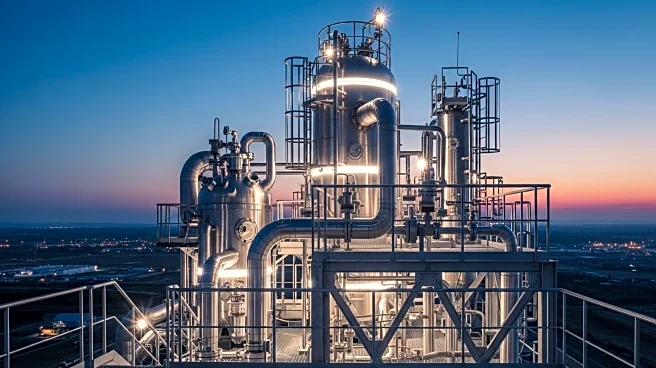What's Happening?
BASF and Yara International ASA have decided to discontinue their joint project aimed at developing a low-carbon ammonia production facility with carbon capture and storage in the U.S. Gulf Coast region. This decision aligns with the companies' strategic focus on initiatives that offer the highest potential for value creation. Despite the project's termination, BASF and Yara continue their collaboration at a world-scale ammonia plant located at BASF's site in Freeport, Texas. BASF also produces ammonia in Ludwigshafen, Germany, and Antwerp, Belgium, while Yara operates the largest ammonia system globally, with production facilities across Europe, the Americas, and Asia.
Why It's Important?
The discontinuation of the low-carbon ammonia project reflects the shifting priorities within the chemical industry towards more profitable ventures. This decision may impact the U.S. Gulf Coast's role in the global ammonia market, potentially affecting local economic activities and employment. The move also highlights the challenges companies face in balancing environmental initiatives with economic goals. As Yara continues to evaluate investment opportunities in U.S. ammonia, the industry may see shifts in investment patterns, influencing the future landscape of sustainable chemical production.
What's Next?
Yara plans to continue its ammonia strategy by evaluating and maturing equity investment opportunities in the U.S. This could lead to new projects or partnerships aimed at optimizing their project portfolio. Stakeholders in the chemical industry may closely monitor Yara's next steps, as they could signal broader trends in sustainable production and investment strategies. Additionally, the decision may prompt discussions among industry leaders about the viability and profitability of low-carbon initiatives.
Beyond the Headlines
The termination of the project raises questions about the long-term commitment of major chemical companies to low-carbon technologies. It underscores the tension between environmental sustainability and economic viability, a critical issue as industries worldwide grapple with climate change. The decision may influence regulatory and policy discussions regarding carbon capture and storage technologies, potentially affecting future environmental legislation.









